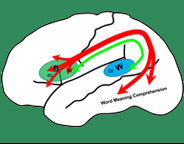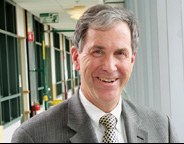 |
 |
|||
| APRIL 4, 2008 | ||||
 |
Imaging Spotlights Language Difference in Human and Chimp Brains Using a non-invasive imaging technique, Yerkes researchers compared human brain structures to those of chimpanzees, our closest living relative. They discovered a language feature unique to the human brain that sheds light on how human language evolved. Read more . . . |
|||
 |
Mediterranean Diet = Less Oxidative Stress People who eat a Mediterranean diet have lower levels of oxidative stress, cardiologist Viola Vaccarino has found. This may explain the protective health benefits of eating a diet rich in fruits, vegetables, whole grain breads, fish and poultry, with olive oil as the main source of fat. Read more . . . |
|||
 |
Fruit Flies Lead the Way to Fragile X Drugs Fruit flies are helping guide geneticist Steve Warren closer to drugs that could reverse the features of fragile X syndrome - a frequent form of inherited mental retardation and one of the leading causes of autism. His research uses the first chemical genetic screen for fragile X syndrome and shows how Drosophila could help other scientists screen for new drugs. Read more . . . |
|||
 |
The Busy Life of a Research VP As new WHSC vice president for research, David Stephens' new charge is to enhance multi-disciplinary research across the health sciences and to craft a strategic research vision. This profile details how he plans to help lead Emory to the next level as a leading research institution. Read more . . . |
|||
 |
Simple Blood Test Could Alter Course of Colon Cancer Epidemiologist Robin Bostick is developing a simple blood test to detect biomarkers of risk for colon cancer that can be treated before disease occurs. He is studying more than 1,300 people to see if calcium and vitamin D could alter the biomarkers and prevent the recurrence of colon polyps, a precursor to cancer. Read more . . . |
|||
 |
Training the Ebola Handlers Emory is changing the way people train to work in laboratories that handle the most dangerous pathogens in the world. Since it opened the world's first mock BSL 3 / 4 laboratory designed for simulation training, Emory has trained more than 300 people to cope with worst-case scenarios. Read more . . . |
|||
 |
Turning Down the Heat Means Better Sleep for Dialysis Patients Nursing professor Kathy Parker has found a simple solution to the sleep problems that plaque 85 percent of dialysis patients. Lowering the temperature of dialysis fluid by two degrees centigrade normalizes the body's core temperature and leads to a better night's sleep. Read more . . . |
|||
 |
Lung Cancer Cells' Survival Gene May Be Drug Target One of the deadliest forms of cancer appears to carry a specific weakness. When a key gene called 14-3-3zeta is silenced, lung cancer cells can't survive on their own, Emory researchers have found. The gene is a potential target for anti-cancer drugs. Read more . . . |
|||
 |
Howard Hughes Medical Institute Opens Doors for Early-Career Scientists The Howard Hughes Medical Institute is seeking outstanding scientists to apply for its Early Career Scientist Competition. HHMI will choose 70 scientists from fields related to biology and medicine. April 30 is the deadline for submitting an intent to apply, and June 10 is the application deadline. An applicant's first faculty position must have begun no earlier than June 1, 2002 and no later than Sept. 1, 2006. Read more . . . |
|||
 |
 |
|||